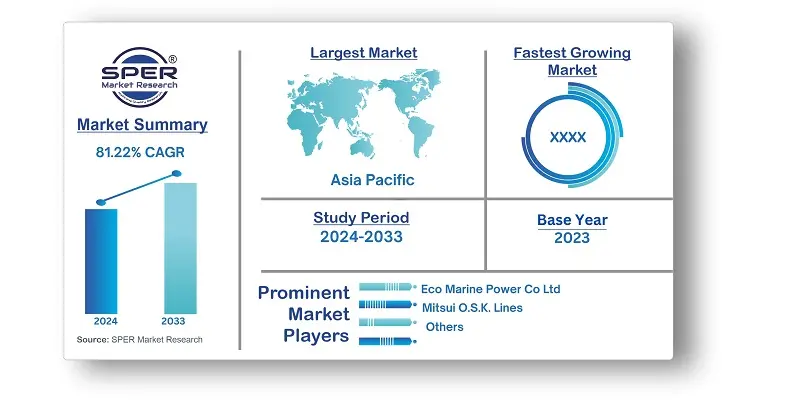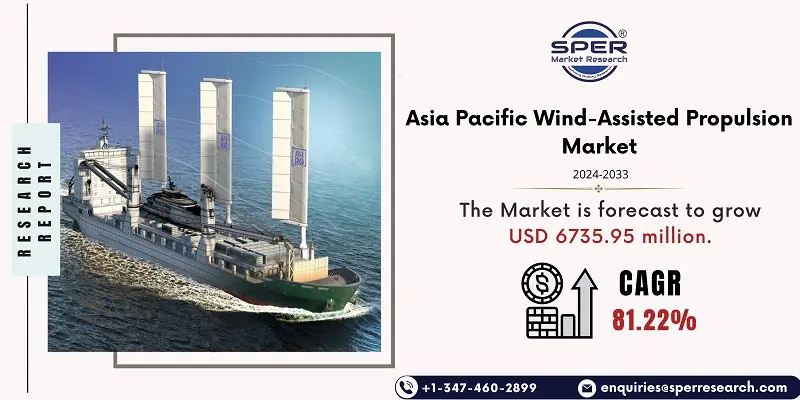
Asia Pacific Wind-Assisted Propulsion Market Trends, Growth, Size, Revenue, Future Outlook
Asia Pacific Wind-Assisted Propulsion Market Size - By Application, By Technology, By Installation Type, By Vessel Type - Regional Outlook, Competitive Strategies and Segment Forecast to 2033
| Published: Jul-2024 | Report ID: POAE2462 | Pages: 1 - 152 | Formats*: |
| Category : Power & Energy | |||
- In May 2022, Econowind and Vertom announced their collaboration to provide wind-assist VentoFoil systems for a number of vessels before the end of 2022. Econowind's first fleet order would be for the general cargo ships MV Progress and MV Perfect, where the initial installations would take place.
- In April 2021, BAR Technologies and Yara Marine Technologies signed an exclusive agreement to work on the design and deployment of wind-assisted propulsion systems for the global shipping industry. This new system, which uses solid wing sails, is intended to provide the shipping industry with fuel efficiency savings of up to 30%.


| Report Metric | Details |
| Market size available for years | 2020-2033 |
| Base year considered | 2023 |
| Forecast period | 2024-2033 |
| Segments covered | By Application, By Technology, By Installation Type, By Vessel Type |
| Regions covered | China, Japan, India, South Korea, Australia, Indonesia, Others |
| Companies Covered | Eco Marine Power Co Ltd, Mitsui O.S.K. Lines. |
- Shipping Companies
- Shipbuilders and Shipyards
- Marine Equipment Manufacturers
- Port Authorities and Operators
- Government and Regulatory Bodies
- Environmental Organizations
- Logistics and Freight Forwarding Companies
- Maritime Research Institutions
- Investors and Financial Institutions
- Renewable Energy Advocates
| By Application: |
|
| By Technology: |
|
| By Installation Type: |
|
| By Vessel Type: |
|
- Asia Pacific Wind-Assisted Propulsion Market Size (FY’2024-FY’2033)
- Overview of Asia Pacific Wind-Assisted Propulsion Market
- Segmentation of Asia Pacific Wind-Assisted Propulsion Market By Application (Cargo Ships, Passenger Ships, Fishing Vessels, Bulk Carriers)
- Segmentation of Asia Pacific Wind-Assisted Propulsion Market By Technology (Towing Kites, Sails, Flettner Rotors, Suction Wings, Others)
- Segmentation of Asia Pacific Wind-Assisted Propulsion Market By Installation Type (Retrofit, New Installation)
- Segmentation of Asia Pacific Wind-Assisted Propulsion Market By Vessel Type (Wind-Assisted Motor Vessels, Purely Wind Vessels)
- Statistical Snap of Asia Pacific Wind-Assisted Propulsion Market
- Expansion Analysis of Asia Pacific Wind-Assisted Propulsion Market
- Problems and Obstacles in Asia Pacific Wind-Assisted Propulsion Market
- Competitive Landscape in the Asia Pacific Wind-Assisted Propulsion Market
- Impact of COVID-19 and Demonetization on Asia Pacific Wind-Assisted Propulsion Market
- Details on Current Investment in Asia Pacific Wind-Assisted Propulsion Market
- Competitive Analysis of Asia Pacific Wind-Assisted Propulsion Market
- Prominent Players in the Asia Pacific Wind-Assisted Propulsion Market
- SWOT Analysis of Asia Pacific Wind-Assisted Propulsion Market
- Asia Pacific Wind-Assisted Propulsion Market Future Outlook and Projections (FY’2024-FY’2033)
- Recommendations from Analyst
1.1. Scope of the report1.2. Market segment analysis
2.1. Research data source2.1.1. Secondary Data2.1.2. Primary Data2.1.3. SPER’s internal database2.1.4. Premium insight from KOL’s2.2. Market size estimation2.2.1. Top-down and Bottom-up approach2.3. Data triangulation
4.1. Driver, Restraint, Opportunity and Challenges analysis4.1.1. Drivers4.1.2. Restraints4.1.3. Opportunities4.1.4. Challenges4.2. COVID-19 Impacts of the Asia Pacific Wind-Assisted Propulsion Market
5.1. SWOT Analysis5.1.1. Strengths5.1.2. Weaknesses5.1.3. Opportunities5.1.4. Threats5.2. PESTEL Analysis5.2.1. Political Landscape5.2.2. Economic Landscape5.2.3. Social Landscape5.2.4. Technological Landscape5.2.5. Environmental Landscape5.2.6. Legal Landscape5.3. PORTER’s Five Forces5.3.1. Bargaining power of suppliers5.3.2. Bargaining power of buyers5.3.3. Threat of Substitute5.3.4. Threat of new entrant5.3.5. Competitive rivalry5.4. Heat Map Analysis
6.1. Asia Pacific Wind-Assisted Propulsion Market Manufacturing Base Distribution, Sales Area, Product Type6.2. Mergers & Acquisitions, Partnerships, Product Launch, and Collaboration in Asia Pacific Wind-Assisted Propulsion Market
7.1. Asia Pacific Wind-Assisted Propulsion Market Size, Share and Forecast, By Application, 2020-20267.2. Asia Pacific Wind-Assisted Propulsion Market Size, Share and Forecast, By Application, 2027-20337.3. Cargo Ships7.3.1. Tankers7.3.2. Car Carriers/Ro-Ro Vessels7.3.3. Container Ships7.3.4. General Cargo Vessels7.4. Passenger Ships7.5. Fishing Vessels7.6. Bulk Carriers
8.1. Asia Pacific Wind-Assisted Propulsion Market Size, Share and Forecast, By Technology, 2020-20268.2. Asia Pacific Wind-Assisted Propulsion Market Size, Share and Forecast, By Technology, 2027-20338.3. Towing Kites8.4. Sails8.4.1. Soft-Wing Sails8.4.2. Hard-Wing Sails8.5. Flettner Rotors8.6. Suction Wings8.7. Others
9.1. Asia Pacific Wind-Assisted Propulsion Market Size, Share and Forecast, By Installation Type, 2020-2026
9.2. Asia Pacific Wind-Assisted Propulsion Market Size, Share and Forecast, By Installation Type, 2027-20339.3. Retrofit9.4. New Installation
10.1. Asia Pacific Wind-Assisted Propulsion Market Size, Share and Forecast, By Vessel Type, 2020-202610.2. Asia Pacific Wind-Assisted Propulsion Market Size, Share and Forecast, By Vessel Type, 2027-203310.3. Wind-Assisted Motor Vessels10.4. Purely Wind Vessels
11.1. Asia Pacific Wind-Assisted Propulsion Market Size and Market Share
12.1. Asia Pacific Wind-Assisted Propulsion Market Size and Market Share By Region (2020-2026)12.2. Asia Pacific Wind-Assisted Propulsion Market Size and Market Share By Region (2027-2033)12.3. China12.4. Japan12.5. India12.6. South Korea12.7. Australia12.8. Indonesia12.9. Others
13.1. Eco Marine Power Co Ltd
13.1.1. Company details13.1.2. Financial outlook13.1.3. Product summary13.1.4. Recent developments
13.2. Mitsui O.S.K. Lines
13.2.1. Company details13.2.2. Financial outlook13.2.3. Product summary13.2.4. Recent developments
13.3. Others
SPER Market Research’s methodology uses great emphasis on primary research to ensure that the market intelligence insights are up to date, reliable and accurate. Primary interviews are done with players involved in each phase of a supply chain to analyze the market forecasting. The secondary research method is used to help you fully understand how the future markets and the spending patterns look likes.
The report is based on in-depth qualitative and quantitative analysis of the Product Market. The quantitative analysis involves the application of various projection and sampling techniques. The qualitative analysis involves primary interviews, surveys, and vendor briefings. The data gathered as a result of these processes are validated through experts opinion. Our research methodology entails an ideal mixture of primary and secondary initiatives.



Frequently Asked Questions About This Report
PLACE AN ORDER
Year End Discount
Sample Report
Pre-Purchase Inquiry
NEED CUSTOMIZATION?
Request CustomizationCALL OR EMAIL US
100% Secure Payment






Related Reports
Our Global Clients
Our data-driven insights have influenced the strategy of 200+ reputed companies across the globe.




















